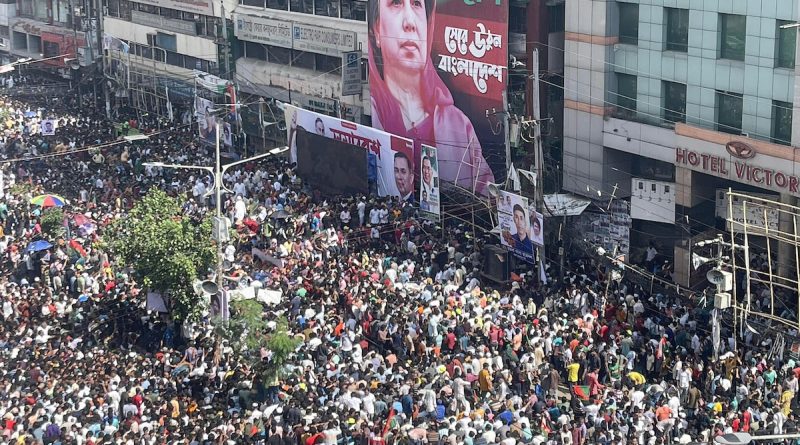Bangladesh Leader Speaks Out Against Attacks on Hindu Communities
Mr Alamgir stated that the India-Bangladesh relationship would remain strong.
Following a week of rapid developments in Bangladesh, including Sheikh Hasina’s removal, widespread unrest, and the establishment of a temporary government, the country’s head justice agreed to resign on Saturday. Although the timing of elections is uncertain, it is definite that the Bangladesh Nationalist Party (BNP), led by Khaleda Zia, will have a significant role in them, being one of the major political parties in the nation.
During the extensive interview, Mr Alamgir mentioned that if Ms Zia is medically fit, she will lead the BNP in the elections, and that the party will strive to enhance the relationship between India and Bangladesh if it assumes power. He highlighted that attacks on Hindus in the nation were instigated by certain individuals attempting to exploit the circumstances and clarified that it was not part of any “organized plan”.
The BNP leader also expressed his belief that the Bangladesh army will refrain from intervening in the political process moving forward and affirmed that extremist factions were not involved in the protests.
Regarding the resignation of the chief justice, Mr Alamgir remarked, “The chief justice is commonly known here as an ally of the previous regime, which caused significant casualties in the country and engaged in unprecedented corruption during that period… There was a persistent demand for his dismissal due to his lack of objectivity, fairness, and impartiality.”
“The judicial system in Bangladesh has been completely decimated. It was an institution that, with the support of the prior administration, was thoroughly politicized,” he added.
Timeline for Elections?
While Nobel laureate Muhammad Yunus has assumed leadership of an interim government and is perceived favorably among the movement that led to Sheikh Hasina’s ousting, the primary question remains about the schedule for upcoming elections in Bangladesh.
Addressing this issue and the potential role of 78-year-old Khaleda Zia, recently released from incarceration, in the elections, Mr Alamgir stated, “She is in poor health, currently hospitalized, suffering from multiple illnesses. Despite repeated requests to allow her treatment abroad, which were unsuccessful, she cannot travel presently according to medical advice. If she recovers, she will undoubtedly participate in the election.”
The BNP leader indicated that while his party is prepared for elections at any time, the interim government would require additional time to organize them.
“The entire electoral apparatus has been severely compromised, incapable of conducting a fair and unbiased election. Reforms must be implemented within the electoral system,” he remarked.
Mr Alamgir also dismissed claims made by Sheikh Hasina’s son, Sajeeb Wazed, that the prime minister did not resign and refuted reports suggesting that she was forcibly removed at gunpoint.
“The President himself, in the presence of political parties and the military, confirmed her resignation. There was no coercion involved… It was a revolution. When a crowd of hundreds of thousands approached Ms Hasina’s residence, her security and armed forces presented her with two options: face the mob or leave the country. Ultimately, she chose to depart,” he explained.
Relations with India, Assaults on Minorities
Mr Alamgir stressed that the bond between India and Bangladesh would endure and assured that the BNP would endeavor to strengthen it if they assume power.
When questioned about attacks on minority groups in the nation, including Hindus, Buddhists, and Christians, and whether they were part of a systematic agenda, he refuted the notion, stating, “This is entirely false. During times of transition in our nation or any other, especially in developing countries, certain individuals seek to exploit the situation… In Bangladesh, unfortunately, with each revolution, leaders from the ruling party, whether Muslim or Hindu, are targeted. While there may be sporadic incidents targeting minorities, it is not part of a political or systematic scheme. Never,” he emphasized, highlighting the exceptional communal harmony in the country.
UN Intervention
When asked about potential reprisals against supporters of Ms Hasina’s Awami League or a purge of former military and police personnel aligned with her government, the BNP leader disclosed that the United Nations has been requested to conduct an inquiry.
“If individuals are found culpable of violating human rights, engaging in systematic repression of opposition groups, or enforced disappearances, they will be investigated and held accountable,” he affirmed.
Mr Alamgir also expressed confidence that the military would not interfere with the political process moving forward.
“The public trusts the military to safeguard the nation. I do not anticipate any actions by them that contradict the will of the people,” he stated.
Extremist Elements?
According to Mr Alamgir, the violence in the country has significantly subsided, and he sought to dispel concerns about extremist groups participating in the movement against Sheikh Hasina’s leadership.
“The Jamaat (Jamaat-e-Islami) is not an extremist political party, although there were other extremist factions in Bangladesh, which I believe are no longer active… Extremist elements are not involved in any capacity in the protests. Not at all. The movement is entirely led by students, many of whom are progressive individuals. Some of the movement leaders are exceptionally talented. I am confident that this revolution will undoubtedly succeed,” he concluded.
Waiting for response to load…

